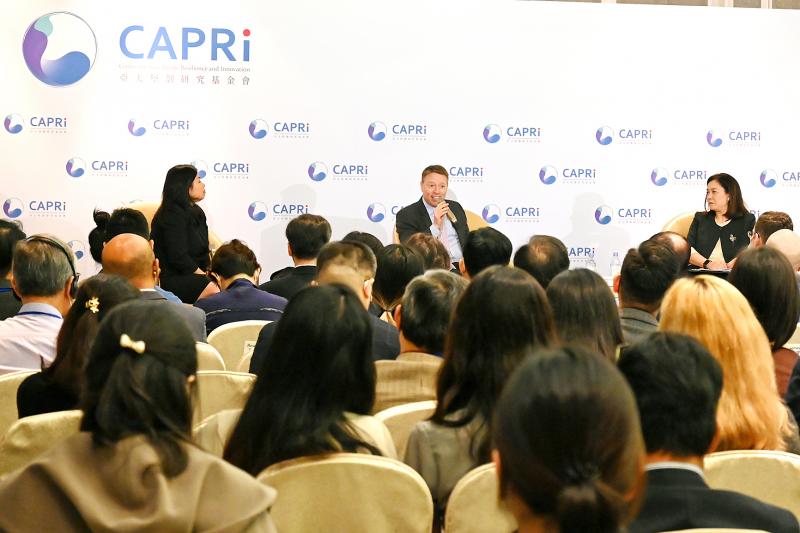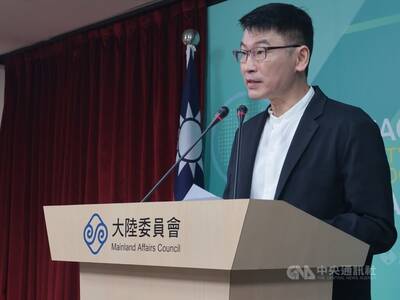An ex-United States national security advisor on Wednesday called for the creation of a new international pandemic-response coalition that includes Taiwan to counter the shortcomings of the World Health Organization (WHO).
At a forum in Taipei, former U.S. Deputy National Security Matt Pottinger said China's flouting in 2019 of WHO rules introduced after the 2001-2004 SARS outbreak showed the need for a coalition of countries with accountable governments and freedom of speech to fight future international health crises.

Photo: Wang Yi-sung, Taipei Times
Pottinger suggested that the G7 group of leading industrial nations, Taiwan, India, and Australia work together to form a "biological intelligence" institution, which would also take collective action when countries fail to share information.

Photo: Wang Yi-sung, Taipei Times
The former White House staffer added that the institutional shortcomings of the WHO -- which "comically" did not recognize the existence of Taiwan -- meant it had been unable to roll out rapid and efficient pandemic-response measures.
In situations where transparency is essential, countries like Taiwan are at an advantage because their democratically elected political leadership is more accountable, Pottinger said.
Pottinger praised Taiwan for being a source of reliable information about COVID-19 when it first emerged in China, expressing gratitude to former Vice President Chen Chien-jen's (陳建仁) for his assistance in providing personal protective equipment to countries, including the U.S., in the early stages of the pandemic.
Pottinger was speaking at "The Origin and Management of COVID-19: Views from the U.S. Front Line" forum, which was co-sponsored by the Center for Asia-Pacific Resilience and Innovation (CAPRI), Taipei, and the Miller Center of Public Affairs at the University of Virginia, Charlottesville.

ENDORSING TAIWAN: Honduran presidential candidate Nasry Afura said that Honduras was ‘100 times better off’ when it was allied with Taipei The Ministry of Foreign Affairs yesterday said it would explore the possibility of restoring diplomatic relations with Honduras based on the principle of maintaining national interests and dignity. The ministry made the remarks in response to reporters’ questions regarding an article titled: “Will Taiwan Regain a Diplomatic Ally?” published in The Diplomat on Saturday. The article said Honduras’ presidential election in November could offer Taiwan the chance to regain an ally, as multiple candidates have promoted re-establishing diplomatic relations with Taiwan. Honduras severed diplomatic ties with Taiwan in March 2023 in favor of Beijing, but since switching its diplomatic recognition,

A fourth public debate was held today about restarting the recently decommissioned Ma-anshan Nuclear Power Plant, ahead of a referendum on the controversial issue to be held in less than two weeks. A referendum on Aug. 23 is to ask voters if they agree that “the Ma-anshan Nuclear Power Plant should continue operations upon approval by the competent authority and confirmation that there are no safety concerns.” Anyone over 18 years of age can vote in the referendum. The vote comes just three months after its final reactor shut down, officially making Taiwan nuclear-free. Taiwan People’s Party Chairman Huang Kuo-chang (黃國昌) represented

Scoot announced yesterday that starting in October, it would increase flights between Taipei and Japan’s Narita airport and Hokkaido, and between Singapore and Taipei. The low-cost airline, a subsidiary of Singapore Airlines, also said it would launch flights to Chiang Rai in Thailand, Okinawa and Tokyo’s Haneda airport between December and March next year. Flights between Singapore and Chiang Rai would begin on Jan. 1, with five flights per week operated by an Embraer E190-E2 aircraft, Scoot said. Flights between Singapore and Okinawa would begin on Dec. 15, with three flights per week operated by Airbus A320 aircraft, the airline said. Services between Singapore

The Mainland Affairs Council (MAC) yesterday announced a ban on all current and former government officials from traveling to China to attend a military parade on Sept. 3, which Beijing is to hold to mark the 80th anniversary of the end of the Second Sino-Japanese War. "This year marks the 80th anniversary of the end of World War II and the Republic of China’s victory in the War of Resistance [Against Japan]," MAC Deputy Minister and spokesperson Liang Wen-chieh (梁文傑) told a regular news briefing in Taipei. To prevent Beijing from using the Sept. 3 military parade and related events for "united